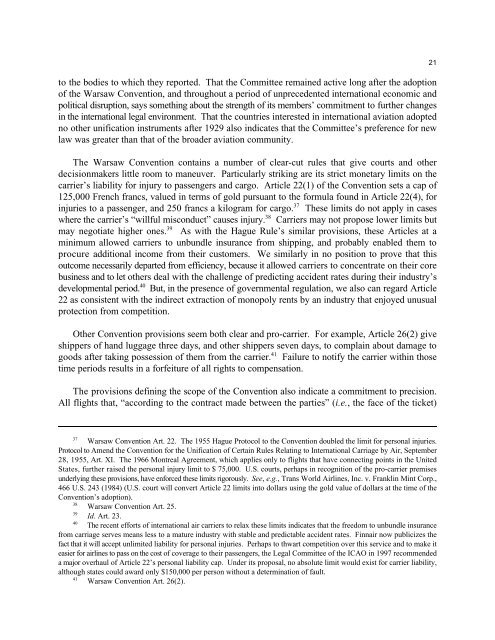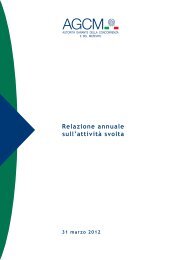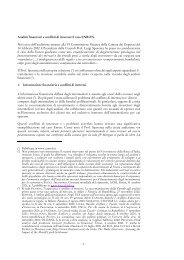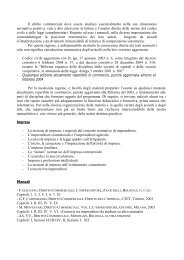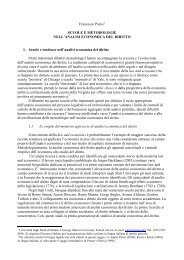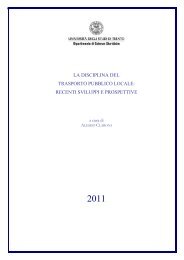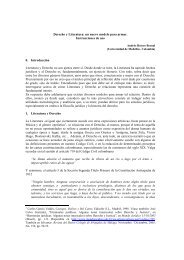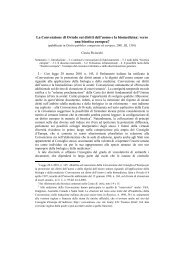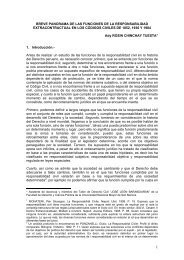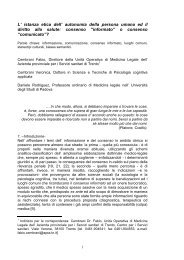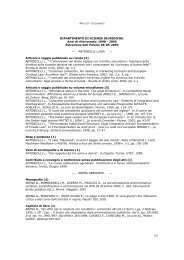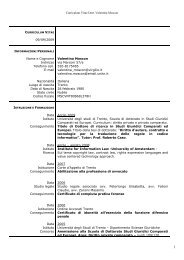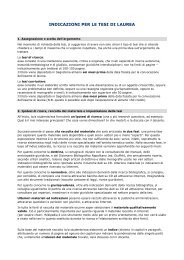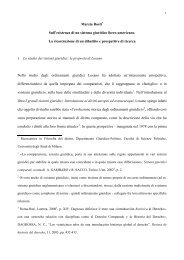The Futility of Unification and Harmonization in International ...
The Futility of Unification and Harmonization in International ...
The Futility of Unification and Harmonization in International ...
Create successful ePaper yourself
Turn your PDF publications into a flip-book with our unique Google optimized e-Paper software.
to the bodies to which they reported. That the Committee rema<strong>in</strong>ed active long after the adoption<strong>of</strong> the Warsaw Convention, <strong>and</strong> throughout a period <strong>of</strong> unprecedented <strong>in</strong>ternational economic <strong>and</strong>political disruption, says someth<strong>in</strong>g about the strength <strong>of</strong> its members’ commitment to further changes<strong>in</strong> the <strong>in</strong>ternational legal environment. That the countries <strong>in</strong>terested <strong>in</strong> <strong>in</strong>ternational aviation adoptedno other unification <strong>in</strong>struments after 1929 also <strong>in</strong>dicates that the Committee’s preference for newlaw was greater than that <strong>of</strong> the broader aviation community.<strong>The</strong> Warsaw Convention conta<strong>in</strong>s a number <strong>of</strong> clear-cut rules that give courts <strong>and</strong> otherdecisionmakers little room to maneuver. Particularly strik<strong>in</strong>g are its strict monetary limits on thecarrier’s liability for <strong>in</strong>jury to passengers <strong>and</strong> cargo. Article 22(1) <strong>of</strong> the Convention sets a cap <strong>of</strong>125,000 French francs, valued <strong>in</strong> terms <strong>of</strong> gold pursuant to the formula found <strong>in</strong> Article 22(4), for37<strong>in</strong>juries to a passenger, <strong>and</strong> 250 francs a kilogram for cargo. <strong>The</strong>se limits do not apply <strong>in</strong> cases38where the carrier’s “willful misconduct” causes <strong>in</strong>jury. Carriers may not propose lower limits but39may negotiate higher ones. As with the Hague Rule’s similar provisions, these Articles at am<strong>in</strong>imum allowed carriers to unbundle <strong>in</strong>surance from shipp<strong>in</strong>g, <strong>and</strong> probably enabled them toprocure additional <strong>in</strong>come from their customers. We similarly <strong>in</strong> no position to prove that thisoutcome necessarily departed from efficiency, because it allowed carriers to concentrate on their corebus<strong>in</strong>ess <strong>and</strong> to let others deal with the challenge <strong>of</strong> predict<strong>in</strong>g accident rates dur<strong>in</strong>g their <strong>in</strong>dustry’s40developmental period. But, <strong>in</strong> the presence <strong>of</strong> governmental regulation, we also can regard Article22 as consistent with the <strong>in</strong>direct extraction <strong>of</strong> monopoly rents by an <strong>in</strong>dustry that enjoyed unusualprotection from competition.Other Convention provisions seem both clear <strong>and</strong> pro-carrier. For example, Article 26(2) giveshippers <strong>of</strong> h<strong>and</strong> luggage three days, <strong>and</strong> other shippers seven days, to compla<strong>in</strong> about damage to41goods after tak<strong>in</strong>g possession <strong>of</strong> them from the carrier. Failure to notify the carrier with<strong>in</strong> thosetime periods results <strong>in</strong> a forfeiture <strong>of</strong> all rights to compensation.<strong>The</strong> provisions def<strong>in</strong><strong>in</strong>g the scope <strong>of</strong> the Convention also <strong>in</strong>dicate a commitment to precision.All flights that, “accord<strong>in</strong>g to the contract made between the parties” (i.e., the face <strong>of</strong> the ticket)2137Warsaw Convention Art. 22. <strong>The</strong> 1955 Hague Protocol to the Convention doubled the limit for personal <strong>in</strong>juries.Protocol to Amend the Convention for the <strong>Unification</strong> <strong>of</strong> Certa<strong>in</strong> Rules Relat<strong>in</strong>g to <strong>International</strong> Carriage by Air, September28, 1955, Art. XI. <strong>The</strong> 1966 Montreal Agreement, which applies only to flights that have connect<strong>in</strong>g po<strong>in</strong>ts <strong>in</strong> the UnitedStates, further raised the personal <strong>in</strong>jury limit to $ 75,000. U.S. courts, perhaps <strong>in</strong> recognition <strong>of</strong> the pro-carrier premisesunderly<strong>in</strong>g these provisions, have enforced these limits rigorously. See, e.g., Trans World Airl<strong>in</strong>es, Inc. v. Frankl<strong>in</strong> M<strong>in</strong>t Corp.,466 U.S. 243 (1984) (U.S. court will convert Article 22 limits <strong>in</strong>to dollars us<strong>in</strong>g the gold value <strong>of</strong> dollars at the time <strong>of</strong> theConvention’s adoption).38Warsaw Convention Art. 25.39Id. Art. 23.40<strong>The</strong> recent efforts <strong>of</strong> <strong>in</strong>ternational air carriers to relax these limits <strong>in</strong>dicates that the freedom to unbundle <strong>in</strong>surancefrom carriage serves means less to a mature <strong>in</strong>dustry with stable <strong>and</strong> predictable accident rates. F<strong>in</strong>nair now publicizes thefact that it will accept unlimited liability for personal <strong>in</strong>juries. Perhaps to thwart competition over this service <strong>and</strong> to make iteasier for airl<strong>in</strong>es to pass on the cost <strong>of</strong> coverage to their passengers, the Legal Committee <strong>of</strong> the ICAO <strong>in</strong> 1997 recommendeda major overhaul <strong>of</strong> Article 22’s personal liability cap. Under its proposal, no absolute limit would exist for carrier liability,although states could award only $150,000 per person without a determ<strong>in</strong>ation <strong>of</strong> fault.41Warsaw Convention Art. 26(2).


